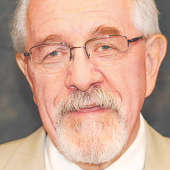- Christmas shopping is done, presents wrapped, strings attached? (12/14/16)
- Cecil is dead and human lives are threatened every day (8/12/15)
- As state flags go, Nebraska's ranks 50th (7/8/15)
- When everything looks like a nail (4/29/15)
- Who remembers to coal slurry pipeline debate? (3/11/15)
- More revelations in Department of Corrections mess (12/17/14)
- The Legislature becomes more Republican (11/19/14)
Opinion
Sometimes, preservation is the best answer
Wednesday, November 20, 2013
A few weeks ago, I shared some ideas from the former director of one of the state's most philanthropic private foundations who urged Nebraska lawmakers to dip into the state's $679 million cash reserve fund to invest in community development to make the state even more attractive to outsiders.
Lyn Wallin Ziegenbein, longtime executive director of the Peter Kiewit Foundation, told members of the Legislature's long-range planning committee to use some of the money as a catalyst for communities to build: libraries and parks; public art and plantings; health facilities; large recreation areas; and supported law enforcement to bring them up to par as part of the "Good Life."
I received some pushback on the topic. Good ideas and laudable goals, I was told, but the stuff of fluff. "Putting lipstick on a pig," one person said. I spent enough time doing community development and historic preservation work in a previous life to know that physical improvements on a building mean nothing if the structure isn't sound and occupied with a viable business. Neither is the quality of life any better with nice infrastructure and available amenities if the workforce isn't educated and innovative.
It was suggested that the better way to attract those sought after "outside parties" to want to invest in and become a part of Nebraska is to focus on a better educated workforce in areas of technology, science, and math along with a change in attitude toward strengthening what is already there. There needs to be creative thinking by better educated students and teachers to go along with the money infusion that was suggested to the legislative committee.
The "woe are we" mentality of small towns has to be broken. There needs to be an understanding of why the best and the brightest often leave these places never to come back. Often they have left to go someplace where they can be the best and brightest surrounded by other best and brightest. Big cities are full of people who once lived in smaller places and would love to return to a simpler lifestyle some day, but only if they could take their challenging careers and best and brightest colleagues with them. The number of people who can work remotely at these tech type jobs grows exponentially, almost daily.
So why can't they go back home? My previous life experience revealed several factors that need to be addressed. One is housing. I look at communities like Sidney or Chadron that have a lot going for them -- Sidney with a worldwide headquarters for popular retailer Cabela's and Chadron with a four-year college. But there are not enough entrepreneurial or skilled builders who realize the opportunity sitting in front of them to build or remodel housing for the expanded workforce. The builders and remodelers who are that smart are too busy already. I heard from a Cabela's employee in Lincoln who was offered a better job at the same company in Sidney, but turned them down because there's no place to live.
We don't need more public art, but we need better-planned and implemented festival type activities (music, food, art) in smaller communities that attract the type of people that towns really need to be attracting. For the "best and brightest" that communities want to attract, such activity is as appealing an amenity as parks and libraries. Look at the awesome festivals in rural states like Colorado, Washington and New Mexico that draw huge crowds, often from out of state. It's got to be more than just the (insert town name here) festival. AND, that takes money and talent to pull off.
We don't need brand new and shiny, but we need to rehab our existing deteriorating libraries and bring the facilities and their systems into the 21st Century. The last thing we need are more parks, but we need to put money into taking care of the parks we have.
Everyone wants shiny and new but that's not going to fix the problem and it will only create new problems. Preservation saves money and pays dividends.
Let's hope that the Legislature is paying attention as it looks at long-range solutions and visits with the hands-on community developers and preservationists who have the experience to know what is really needed.

